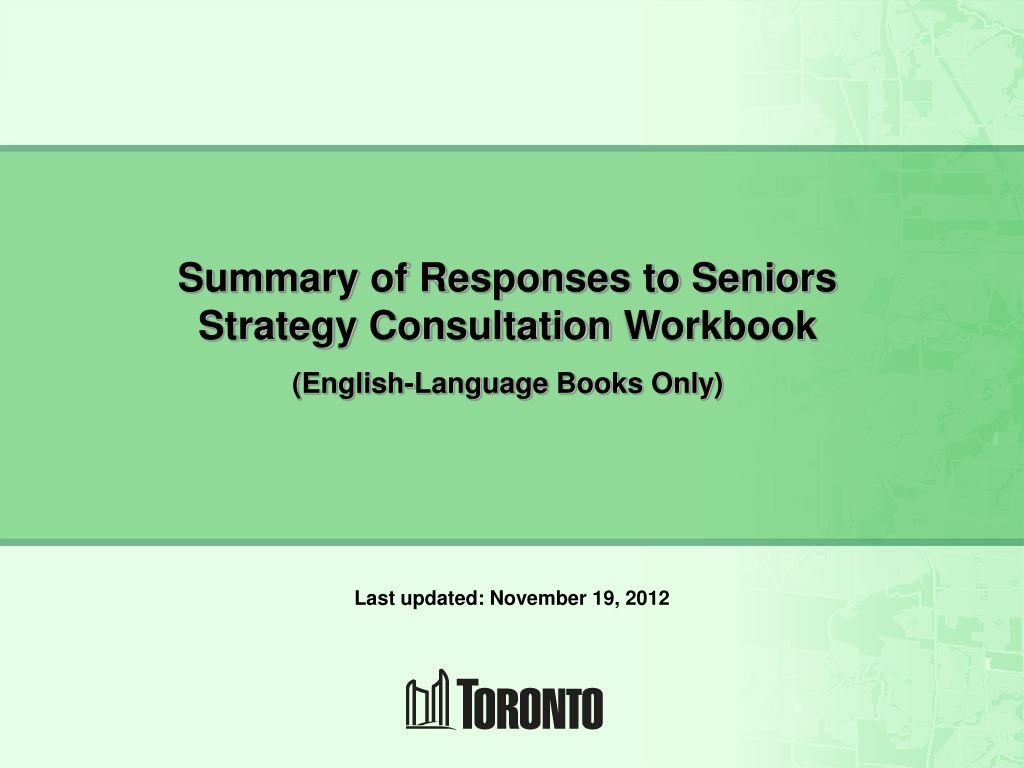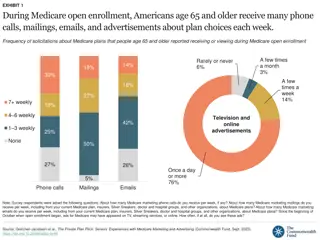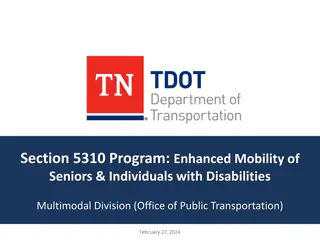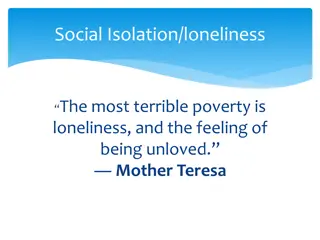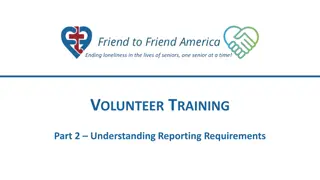Insights from Seniors Strategy Consultation Workbook
The responses to the Seniors Strategy Consultation Workbook highlight two key perspectives - the need for supports in terms of income, health, and accessibility, and the recognition of active and capable seniors who want to be involved. Various themes emerged, with health, housing, transportation, recreation, and community being among the top concerns expressed by respondents.
Download Presentation

Please find below an Image/Link to download the presentation.
The content on the website is provided AS IS for your information and personal use only. It may not be sold, licensed, or shared on other websites without obtaining consent from the author. Download presentation by click this link. If you encounter any issues during the download, it is possible that the publisher has removed the file from their server.
E N D
Presentation Transcript
Summary of Responses to Seniors Strategy Consultation Workbook (English-Language Books Only) Last updated: November 19, 2012 1
Notes on Data Summary is based on 398 completed workbooks submitted by November 2, 2012. 101 of these workbooks were submitted online An additional 91 non-English workbooks were received and have been sent for translation. Tagalog: 6 workbooks Tamil: 9 workbooks Chinese: 43 workbooks Spanish: 33 workbooks Official organizational responses are not included in the quantitative analysis, but are included in the qualitative summary (quotations) for completeness. 2 Page 2
Two Perspectives Feedback tended to originate from two broad perspectives. The first perspective emphasizes the need for supports, both in terms of income/financial supports, as well as health and accessibility supports. There has to be more support put in place to assist seniors to remain in their own homes. My wife and I (70's) live in an apartment because our incomes are not sufficient to allow us to move to assisted living. That's okay for now as my wife is mobile and looks after my dressing and meals. I use a walker to get up two steps and then another 10 steps to the washroom by myself. 3 Page 3
Active Seniors The second perspective emphasizes that many seniors are active, capable, and want to be involved. Above all, they do not want to be segregated. Many respondents argued including seniors in activities will lead to lower system costs in the future. [It is] important not to forget that a large majority of older adults are capable, active, independent and a resource to community. We are part of the solution as well as the problem . Seniors do not want to be segregated. We want to be included as an important part of the City. We want to contribute making this a better City. We would like to have more opportunities to volunteer. Seniors could be given the tools, and where with all to help themselves and each other, through education, discussion and the sharing of ideas (Organizational response from Swansea Area Seniors Association) 4 Page 4
Themes Respondents preferred to highlight specific issues related to the broader themes. A few respondents felt that their issues spanned multiple themes. the themes mentioned above are broad and difficult to point [to] limitations without narrow[ing] to specific issues. All of these are important needs in most seniors lives each of these are essential for a seniors strategy. 5 Page 5
Themes Number of Comments about each Theme Health 85 Housing 80 Transportation 73 Recreation & Community 60 Safety & Security 45 Accessibility 35 Civic Engagement 28 Other: Service Levels 49 Other: Communication 30 Other: Diversity 18 91% of respondents agreed that these themes represent [their] concerns. 6 Page 6
Themes Prominent Sub-Themes Theme Sub-theme 1 Sub-theme 2 Sub-theme 3 Supporting aging in place, staying in the home Supporting long term care facilities Home care Housing Mental health & isolation Health promotion Dental, eye care, prescription medication, etc. Health Transit accessibility Cost of transportation Transportation safety Transportation Costs of programs Opportunities to network and socialize Employment and volunteering opportunities Recreation & Community Elder abuse Fear of crime Physical safety Safety & Security Physical accessibility Language accessibility Accessibility Greater consultation and inclusion in the process Avoid segregation of older residents Civic Engagement 7 Page 7
Other Themes Other themes were raised: Communication Services Levels Diversity & Respect Promoting services that already exist Immigrants, newcomers, and different cultural backgrounds Concerns about low service levels and high access costs Communicating information in other languages Recognition of LGBTQ issues Addressing seniors with low income Dedicated point-person to deal with seniors affairs Educating service providers and the public about seniors issues 8 Page 8
Why are these themes your top priorities? Most respondents were concerned about allowing seniors to live healthy, independent lives in their own homes. My goal and that of most seniors whom I know is to be able to stay in my home and neighbourhood and be as independent as possible for as long as possible. For this, I need home support, good health and the ability to get around. Helping seniors remain in their homes is the key issue which can extend not only to provision of more supportive services, such as assistance with personal care, light housekeeping and meal preparation, etc. but can also include keeping sidewalks safe, improving tic accessibility, more and better recreation programs. All of these contribute to keeping seniors healthy and out of long term care and hospital facilities. 9 Page 9
Quotes: Housing We are led to believe that we can age gracefully in our homes. This cannot be done without adequate home care. Seniors-care homes are prohibitively expensive, so being able to remain in my own home is a priority. My biggest concern is to be able to stay in my home as long as possible. If and when I will have to go to a Nursing Home I wish it would be a decent one. None of your questions covers the Nursing Home horror stories that we so frequently hear about. There should be strict rules and government supervision and proper number of help to give a decent care. The one and only important question that the city needs to attend urgently is to help seniors live in their houses with dignity and are afforded all home care assistance to live at home. (Organizational response from Human Rights and Race Relations Centre (Toronto)) 10 Page 10
Quotes: Health It is imperative that mental health and illness be prominent within the theme of health as it is a very relevant and growing issue for seniors. We believe that health and recreation and community programs need to be recognized as a priority together. As society ages and there is more emphasis on aging at home it is important to provide seniors with activities, or opportunities for seniors to remain active and productive while giving them an a sense of belonging. After all, this will deter people from having to live in long term care homes. My focus is preventive and therapeutic dental care as there is a serious lack and a high need for it. We can easily reduce the high cost of untreated dental disease My GP is retiring. I ve been looking for [a] GP for quite sometime now. (Feedback from Woodgreen Community Care and Access Centre Focus Group) 11 Page 11
Quotes: Transportation I recently suffered an injury and had difficulty going for medical help. There are too many steps to climb up/down at TTC subway thus making whatever treatment I get of non-effect. Why aren t more subway [sic] accessible? Keep sidewalks free from A-signs. I believe that in making services accessible to seniors at convenient locations, it would help maintain their mental health (especially if activities are geared towards them regularly). For low-income seniors living Toronto, affordable accessible transit is also a priority. Many of our clients rely on the TTC Wheel-Trans service. While the TTC does offer a reduced fare for seniors, the cost of a senior s monthly Metropass is $104.00 which is a significant amount for someone living on a fixed income. Further, the TTC will be looking to increase fares again in 2013 and this will pose a financial hardship on low- income seniors living in Toronto. (Organizational response from Advocacy Centre for the Elderly) 12 Page 12
Quotes: Recreation & Community Programs What happened to no overdue fees for seniors as it makes a big difference to low income seniors. I am currently dealing with an elderly parent and struggling to find services designed to address her issues. My mom is visually impaired and suffers from anxiety. Her doctor recommends socializing as the most effective means to help her deal with the recent loss of her spouse. I can t find a program within Toronto for Seniors that isn t related to some kind of activity. I know when I grow old, I don t want to be patronized and shoved in tai chi classes or arts and crafts. Community centres provide a vital range of services to seniors from exercise classes to information sessions on diabetes, nutrition, Alzheimer's, etc. Please maintain these facilities for seniors. When having a new program give opportunity to people who are interested than the people known to the staff. I tried to get involved with there program but I could not. Am a widow and find evenings very quiet and hard to manage if I don't go out and do things....don't want to bother my children. I find many seniors clubs can be very clique and do not feel comfortable going and being a new member. 13 Page 13
Quotes: Safety & Security Elder abuse-many seniors suffer in silence and some do not know how and where to get help. Our TCHC buildings have drug users and dealers living within our walls. What is being done to protect more vulnerable seniors from the abuse that emanates from these people? Keep seniors aware of any break-ins or crimes in their community. 14 Page 14
Quotes: Accessibility My wife tripped and fell on a stone brick embedded into the concrete sidewalk outside no 1 Eglinton East about a year ago. The bricks regularly rise up during winter months providing dangerous tripping traps for all passersby Well maintained sidewalks, more visible and large signs, better information for seniors to get around. Planning and building walking infrastructure for seniors' needs. Reserve seats at meeting to allow seniors to sit at front rows. Does the city have a booklet published with appropriate translations (many older Canadians understand their mother tongue more easily than English or French) outlining the programs that are accessible and available for seniors? If so, are the publications in appropriate print (large font size and easy-to read font types) and talking books? Please consider your crosswalks...even 30 seconds can be too short a time when you are trying to cross the road using a cane, walker. 15 Page 15
Quotes: Civic Engagement Is the city engaging seniors across the city and ethnicities to assess seniors-specific concerns, questions and suggestions? Under health , has research been done with seniors to assess their eating habits/nutrition needs and to include seniors' own suggested solutions to problem areas. Seniors like myself have much to offer to the now generation and deserve some type of respect such as abandoning the S word (senior) as now it is sounding like a dirty word we are tired of being treated like a burden. Have seniors at city hall meetings as representatives. Seniors involved in the preparation of this report have reported that they do not feel that they have a voice in the decision-making process when it comes to decisions being made by public officials. 16 Page 16
Quotes: Funding When taxes continue to rise it's becoming difficult for seniors making below $40,000 a year to stay in their home. There are cut back in other good housing - Government needs to pay special attention. Since seniors represent large bloc of voting public, it would behoove the two other levels of government to provide adequate funding. Also it's high time the private sector worked wit all government levels as a team; Funding for more health stations like the Anne downtown health station should be maintained and strengthened with perhaps satellite centres opened to accommodate overflow. Some seniors have lost confidence in the City's ability to vastly improve services for seniors. This should become a priority to improve the seniors services and expand programs, to meet there future changing needs i.e. eye glasses. Affordability of services and availability - staff that work with seniors often undervalued and under paid. 17 Page 17
Quotes: Communication How many times do I hear I had no idea these services existed (never mind where to access them) especially since increasingly our demographic is multi cultural - people from other countries have no or little concept of these services. Who can Seniors contact if they need help? Is there someone in charge of 'Senior's Affairs? Many seniors do not use the Internet or email, so there really need to be local supports. How about a Seniors Ombudsman/Counsellor who could travel about to the various neighbourhoods and offer advice/referrals? The theme that is vital for the seniors The Canadian Hearing Society works with is COMMUNICATION. It is a thread that runs through every theme listed above. The majority of seniors over 65 have some level of hearing loss which may also be coupled with other cognitive issues; thus, leading to difficulties with communication. Seniors are being encouraged to be more independent via funding entities yet success is not easy since information is not presented in an accessible manner visually, cognitively or acoustically. (Organizational response from Canadian Hearing Society) 18 Page 18
Quotes: Diversity & Respect Respect and social inclusion. Recognize diversity in older people Opportunity of healthy active aging. How can the City support our seniors who are recent immigrants? It is clear from our discussion that many LGBT seniors have lost confidence in the City s ability to vastly improve services for seniors. This was particularly evident when talking about Long Term Care Homes (LTCHs) and the Diversity Our Strength Toolkit. The Diversity our Strength Toolkit was developed in 2008 and was intended to be a four-year project. Four years later there are still homes that have not undergone training and many that have received training are in need of more. (Organizational response from The 519 Church Street Community Centre) 19 Page 19
What can the City do to support Torontos diverse seniors population? Accommodating linguistic and cultural diversity: 35% Have more language specific programs and services for all types of seniors, but not neglecting the English speaking population. Increased services and programming, more affordable services: 10% The lower the income the greater the need for services. 20 Page 20
What can the City do to support Torontos diverse seniors population? Better representation and inclusion of seniors in the decision- making process: 10% Greater representation of diverse elderly population so that their voices and needs are heard. Better communication of the services that already exist for seniors: 10% Does the city have a booklet published with appropriate translations outlining the programs that are accessible and available for seniors? 21 Page 21
What should councilors consider when making decisions about services for seniors? Better representation, engagement, and inclusion of seniors in the process: 35% Don t make policies within the office. Please come out and meet with the every day citizens lives. Get yourself into the community for real, not in an arranged set up like a show kind of visit. Quantity and quality of services: 19% In St. Lawrence we have no dedicated staff to do programming for seniors hence there is very low participation by seniors in community. Housing and long-term care: 10% Publicly elected [officials] should ensure that the Long-Term Care Homes remain under the city. 22 Page 22
How can others support improved City services for seniors? % of Organization Most common suggestion Respondents You / Your organization Input and ongoing consultation 42 Teach students about seniors issues, respect School Boards 36 Community Organizations Affordable programming and services for seniors 37 Access to learning such as discounted tuition and non- credit classes Universities and Colleges 52 Support (financial and volunteering) and engage with seniors groups and programs Businesses 30 Work together and continuously consult with seniors Other 27 23 Page 23
Volunteering and Empowerment One other common idea that continuously emerged was empowering seniors to volunteer and help other seniors: Appoint volunteers telephone committee of seniors helping seniors (24 hours daily). I am a disabled senior and willing to be involved at any level as a volunteer. Create more volunteer opportunities for care-giving by older adults to seniors. Provision of language translation services for government programs. This can be partly provided by volunteers from each community group that can be co-ordinated or aided by the City of Toronto. Offer meaningful paid work and volunteer opportunities for seniors. Recognize the value of their experience. 24 Page 24
For more information contact: Andrea Austen City of Toronto Social Development, Finance and Administration Social Policy, Analysis and Research Telephone: 416-392-5140 Fax: 416-392-4976 Email: Andrea.Austen@toronto.ca 25
